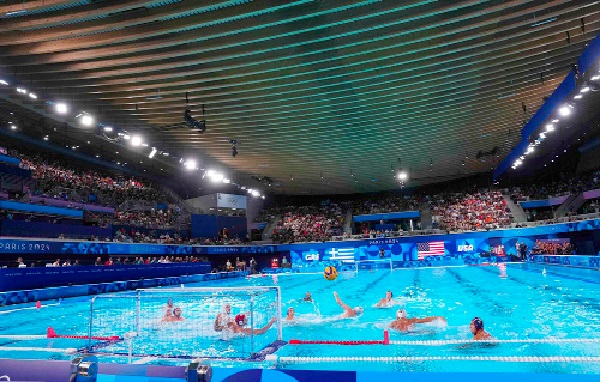The 2024 Paris Olympic Games have already delivered remarkable athletic performances, with American gymnast Simone Biles redefining greatness, Saint Lucia’s Julien Alfred securing her country’s first Olympic medal in the women’s 100m final, and Novak Djokovic achieving the elusive Olympic gold to complete his Career Slam.
As the Games progress, the City of Light will be illuminated by extraordinary feats by elite athletes striving for medals and legacies.
When Paris hands over the torch to Los Angeles, the 2024 Olympics will be remembered for its pivotal moments and the lasting standards and legacies it establishes for future international competitions.
Hosting events like the FIFA World Cup, Olympic Games, and African Games involves more than just thrilling sports moments; it presents countries with intricate project management challenges, particularly concerning sustainability and legacy. Nations must navigate logistical, environmental, and social hurdles to ensure a positive, lasting impact.
The concept of legacy in sports events has evolved significantly since the term was introduced into the Olympic Charter in 2003.
The International Olympic Committee (IOC) aims to encapsulate all long-term benefits initiated or accelerated by hosting the Games, ranging from improved infrastructure and economic boosts to enhanced international relations and cultural enrichment.
The modern Olympic Games have grown exponentially since their inception in 1896. For instance, the Rio 2016 Olympics featured over 11,000 athletes from 206 nations.
This growth highlights the importance of delivering events that not only dazzle during their duration but also contribute to meaningful, sustainable legacies.
Double-edged sword
Sustainability is now a critical focus for host countries. The IOC and host cities place sustainability at the centre of planning, translating commitments into concrete strategies while avoiding pitfalls like underused facilities and environmental degradation.
The Tokyo 2021 Olympics, postponed due to COVID-19, aimed high with sustainability goals. Despite significant challenges, Tokyo sought to set new standards for eco-friendly events. However, the pandemic's unique circumstances make it hard to determine if these achievements are realistic benchmarks for future Games.
The Paris 2024 Olympics have set a new precedent for sustainability and legacy planning. The organising committee aims to halve carbon emissions compared to previous Games and plans to host 95 per cent of events in existing buildings or temporary structures, minimising new construction.
One standout feature is the new Aquatics Centre, the only permanent venue built for Paris 2024, constructed with recycled materials and powered by solar energy.
The Athletes’ Village will utilise solar and geothermal power, with beds made from recycled fishing nets and reinforced cardboard, showcasing a commitment to sustainability in every detail.
Ghana's ambitious vision
The 2023 African Games, held in Accra in March 2023, exemplify the ambitious vision and considerable investment required to host a successful international competition.
The government invested over $240 million on infrastructure and organisational expenses. Beyond the thrill of the competition and the pursuit of medals,
Dr Kwaku Ofosu-Asare, Executive Chairman of the Local Organising Committee (LOC), believes the continental event will leave a long-term legacy.
These include modern sporting infrastructure designed to revive various sporting disciplines and a plan to establish a University for Sports Development. This institution aims to utilise the Borteyman Sports Complex and other facilities, fostering the development of the entire sports ecosystem.
The Rio 2016 Olympics highlighted the importance of careful planning and realistic projections. While awareness and appeal for the Games were high, the long-term social and economic impacts fell short of expectations.
Barcelona’s 1992 Olympics offer a positive example of enduring social legacy. Initiatives like sports activities for children facing social exclusion continue to benefit the community, aligning with the Olympic Movement’s vision of "Building a better world through sport."
Balancing act
The economic implications of hosting major sports events are profound. The Olympics, for example, drive the IOC’s ability to support sports development globally, distributing 90 per cent of the generated revenue to athletes and sports organisations. This model helps maintain the Olympic Movement's vitality year-round.
However, substantial costs and risks are involved. The 1988 Seoul Olympics saw the displacement of 720,000 people for new infrastructure, highlighting the social costs that can tarnish perceived benefits.
Effective use of public funds and ensuring infrastructure serves the community post- Olympic Games are essential for a positive legacy.
The FIFA World Cup also faces scrutiny regarding sustainability and legacy. Qatar’s 2022 World Cup aimed to leave lasting legacies in economic, social, and environmental spheres, with investments in local businesses, educational projects, and green spaces. However, the long-term impact of these efforts remains debatable.
Looking ahead, Saudi Arabia’s bid to host the 2034 World Cup underscores the region's growing role in global sports. Significant investments in sports infrastructure and initiatives to boost the local sports sector aim to replicate successes and learn from challenges faced by previous hosts.
Lessons for LA 2028
The forthcoming 2028 Olympic Games in Los Angeles can draw valuable lessons from Paris 2024. Prioritising existing infrastructure and temporary venues can reduce environmental impact and costs.
Emphasising renewable energy and sustainable materials, as demonstrated by Paris, provides a template for future organisers.
Engaging the local community from the outset and ensuring social initiatives are integral to the Olympic Games’ planning can foster long-term benefits.
Los Angeles should heed Rio's cautionary tales, ensuring economic projections are realistic and legacy plans robust and actionable.
The Paris 2024 Games offer a compelling blueprint for future hosts, demonstrating that with careful planning, sustainable practices, and a clear vision, major sports events can build a better world through sport.
Los Angeles 2028 and beyond must build on these lessons to create events that captivate during their duration and contribute meaningfully to their host cities long after the closing ceremonies.
